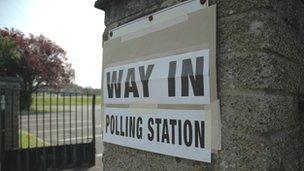Elections to show why county councils count
- Published
With more than 300 seats at stake in "whole council" elections at four county and one unitary authority, it is one of the biggest tests of Midlands political opinion in this famous electoral battleground area outside of a general election.
These councils are significant players in their own right, they are responsible for major services including schools, roads and refuse disposal.

There are elections at four county and one unitary authority in the Midlands
However, often the professional number-crunchers and political soothsayers regale us with their interpretations of the wider electoral significance, we should never lose sight of the huge influence these councils have on millions of people's lives.
That said, let's get down to some serious soothsaying.
Inevitably, we shall be looking to see if the Conservatives lose as many seats as their current poll ratings suggest; whether or not Labour will be major beneficiaries; or will UKIP pick-up support from both of them? And what of the Liberal Democrats?
Our four shire counties (Gloucestershire, Staffordshire, Warwickshire and Worcestershire) and one unitary authority (Shropshire) all go into these elections with substantial Conservative majorities, so Labour strategists are managing expectations carefully.
'Collateral boost'
Realistically, their challenge is to make significant inroads into those Conservative majorities, especially in Staffordshire and Warwickshire.
The other powerful factor at work beneath the headline story is that both the Conservatives and UKIP are coming off an especially high base year.
The last time these seats were contested in 2009, David Cameron's Tories were riding high in the polls while UKIP's support was boosted by the European elections being held at the same time.
This could make it difficult for UKIP to maintain any sense of momentum this time, despite their encouraging poll ratings; while for the Tories it may emphasise how their support has slipped between then and now.
But the Tories may privately reassure themselves with the notion that low turnouts are often thought to favour them over the other major parties, given that there are no other elections to provide a collateral boost to the overall number of voters this time.
The other question lurking in the woodwork stems from my opening explanation about the four county councils and one unitary authorities that are going to the polls.
Gloucestershire, Staffordshire, Warwickshire and Worcestershire are all upper-level authorities in a two-tier system with district councils like Cheltenham, Tamworth, Wyre Forest and Stratford-on-Avon underneath them.

What will the voter turnout be?
By contrast Shropshire's unitary council is responsible for the full set of local services.
Supporters of the unitary model, notably Lord Heseltine in his recent "No Stone Unturned" report, say it is far more efficient and easier for voters to understand.
Is it not confusing for voters, for example, that the districts collect their refuse and the counties dispose of it?
Lord Heseltine wants an active debate about more councils going the way not just of Shropshire but also of Herefordshire, Telford and Wrekin and Stoke-on-Trent: these last three are not going to the polls this year by the way.
He may be pleased to know it is already under way in Gloucestershire and Lord Heseltine certainly believes that with pressure on councils to share and merge more of their operations during this age of austerity it is an idea whose time has come. We shall see.
And what of HS2? It is the issue that dominates politics in shire counties like Warwickshire and Staffordshire. So how will it play into this campaign? Will angry voters on the proposed route see it as their chance to give the government a kicking?
It's not as simple as that of course.
For a start, the Conservative administrations in Staffordshire and Warwickshire have both come out against the project.
But for another, all three main parties at Westminster are strongly in favour of it. Leaving UKIP and the Greens to champion the opposition to it here.
All of which adds spice to the run-up to the general election, just over two years away, and the European elections in 12 months' time.
It was this same combination of elections last time round which offered a self-fulfilling prophecy that the skids were under Gordon Brown's administration.
One fundamental objective for our current leaders will be to prevent the general idea getting around that history may be about to repeat itself.